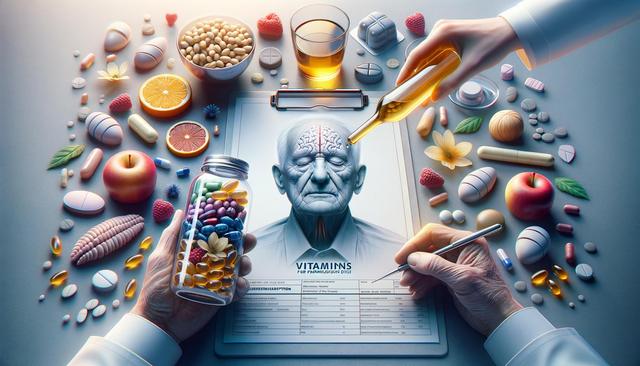Understanding Parkinson’s Disease and Nutritional Needs
Parkinson’s disease is a progressive neurological disorder that primarily affects motor function due to the gradual loss of dopamine-producing neurons in the brain. While the condition is typically managed with medication and therapy, there is growing interest in how nutrition, particularly vitamins, may influence the course or symptoms of the disease. Individuals with Parkinson’s often face challenges related to nutrient absorption, appetite, and gastrointestinal health, which makes adequate vitamin intake especially important. Addressing nutritional gaps may help support general well-being, cognitive function, and energy levels, making vitamins an area worth exploring for those living with this condition.
Some studies suggest that oxidative stress plays a key role in the progression of Parkinson’s, and this has led to a focus on antioxidants, including certain vitamins. In addition, gastrointestinal symptoms such as constipation and poor digestion may impair nutrient absorption, further underscoring the need for a well-rounded dietary strategy that includes essential vitamins. While no vitamin can cure or halt the disease, ensuring adequate intake may contribute positively to the overall management of symptoms.
Vitamin D and Its Impact on Neurological Health
Vitamin D has received considerable attention for its potential role in neurological health. Individuals with Parkinson’s are often found to have lower levels of vitamin D, which has sparked interest in its possible link to disease progression and symptom management. Vitamin D supports brain health by promoting calcium balance and aiding in the function of neurotransmitters. Moreover, it plays a part in immune system regulation, which might be relevant given emerging theories about inflammation in Parkinson’s.
Some researchers have explored whether maintaining adequate vitamin D levels could help with:
- Improving motor function
- Reducing the risk of falls, which are common in Parkinson’s patients
- Enhancing mood and reducing symptoms of depression
Though evidence is not yet conclusive, ensuring sufficient vitamin D intake through sunlight exposure, diet, or supplementation may be a practical step for individuals with Parkinson’s, especially those with limited mobility or who spend little time outdoors.
B Vitamins and Their Role in Brain Function
B vitamins, particularly B6, B12, and folate, are essential for maintaining healthy nerve function and supporting brain health. These vitamins play crucial roles in homocysteine metabolism, and elevated homocysteine levels have been associated with cognitive decline and neurodegenerative diseases, including Parkinson’s. Vitamin B12 deficiency is not uncommon in older adults and those taking certain medications, such as those commonly prescribed for Parkinson’s, which can interfere with absorption.
Benefits associated with B vitamins for people with Parkinson’s include:
- Supporting cognitive function and memory
- Reducing fatigue and improving energy metabolism
- Potentially slowing the rate of brain atrophy
Regular blood tests can help identify deficiencies, and based on the results, healthcare providers may recommend specific supplements or dietary adjustments. Animal products like eggs, fish, and dairy are rich in B vitamins, making them important components of a balanced diet for those who can tolerate them.
Vitamin C and E: Antioxidants with Potential Benefits
Oxidative stress has long been linked to the progression of Parkinson’s disease, and antioxidant vitamins like C and E have been studied for their potential protective effects. These vitamins help neutralize free radicals, which are unstable molecules that can damage cells, including neurons. Although studies have shown mixed results, there is some evidence indicating that higher dietary intake of these vitamins may be associated with a reduced risk of developing Parkinson’s, or a slower progression in those already diagnosed.
Incorporating antioxidant-rich foods into the daily diet can be a simple and effective way to increase vitamin intake. Sources of vitamins C and E include:
- Citrus fruits, berries, and bell peppers (rich in vitamin C)
- Nuts, seeds, and green leafy vegetables (rich in vitamin E)
It is important to note that while supplementation may be beneficial in cases of deficiency, excessive doses of antioxidant vitamins can interfere with other medications or have unintended effects. Therefore, it is advisable to consult a healthcare provider before beginning any new supplement regimen.
Practical Considerations and Personalized Approaches
Every individual with Parkinson’s may have different nutritional needs based on their symptoms, medications, and overall health. Therefore, a personalized approach to vitamin intake is essential. Working with a registered dietitian or healthcare provider can help tailor a nutrition plan that supports optimal health and symptom management. In some cases, vitamins may need to be taken at specific times of day or in certain forms to be most effective and avoid interactions with medication.
Practical tips for managing vitamin intake include:
- Eating a diverse and balanced diet rich in fruits, vegetables, whole grains, and lean proteins
- Practicing regular monitoring of nutrient levels through blood tests
- Being aware of medication interactions that may affect vitamin absorption
In addition, staying hydrated, maintaining a consistent eating schedule, and managing gastrointestinal symptoms can further support nutrient absorption and overall well-being. While vitamins are not a standalone solution for Parkinson’s, they can play a supporting role in a broader care plan that includes medical treatment, physical activity, and mental health support.


